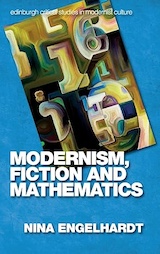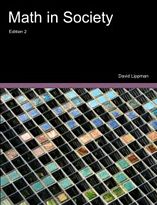
|
FreeComputerBooks.com
Links to Free Computer, Mathematics, Technical Books all over the World
|
|
- Title: Modernism, Fiction and Mathematics
- Author(s) Nina Engelhardt
- Publisher: Edinburgh University Press (June 6, 2018); eBook (Creative Commons Licensed)
- License(s): Creative Commons License (CC)
- Paperback: 200 pages
- eBook: PDF and ePub
- Language: English
- ISBN-10: 1474416233
- ISBN-13: 978-1474416238
- Share This:

|
An analysis of novelistic explorations of modernism in mathematics and its cultural interrelations. Persuasively and engagingly, it demonstrates that modernism's relation to contemporary mathematics was often more analogous than adversarial.
About the Authors- Nina Engelhardt is a lecturer in English Literature at the University of Stuttgart.
- Popular, Recreational, and Miscellaneous Mathematics
- Elementry and High School Mathematics
- Discrete Mathematics
- Mathematical Logic - Set Theory, Model Theory, Proof Theory, Computability, etc.

- Modernism, Fiction and Mathematics (Nina Engelhardt)
- The Mirror Site (1) - PDF
- The Mirror Site (2) - PDF Files
- Book Homepage (PDF, ePub, etc.)
-
 Mathematical Surprises (Mordechai Ben-Ari)
Mathematical Surprises (Mordechai Ben-Ari)
This is open access book provides plenty of pleasant mathematical surprises. There are many fascinating results that do not appear in textbooks although they are accessible with a good knowledge of secondary-school mathematics.
-
 Mathematical Omnibus: Thirty Lectures on Classic Mathematics
Mathematical Omnibus: Thirty Lectures on Classic Mathematics
This is an enjoyable book with suggested uses ranging from a text for a undergraduate Honors Mathematics Seminar to a coffee table book. The common thread in the selected subjects is their illustration of the unity and beauty of mathematics.
-
 Making up Numbers: A History of Invention in Mathematics
Making up Numbers: A History of Invention in Mathematics
This book offers a detailed but accessible account of a wide range of mathematical ideas. Starting with elementary concepts, it leads the reader towards aspects of current mathematical research.
-
 Math Alive (Ingrid Daubechies, et at)
Math Alive (Ingrid Daubechies, et at)
Mathematics has profoundly changed our world, from banking to listening to music. This course is designed for those who haven't had college mathematics but would like to understand some of the mathematical concepts behind important modern applications.
-
 Street-Fighting Math: Guessing & Opportunistic Problem Solving
Street-Fighting Math: Guessing & Opportunistic Problem Solving
This engaging book is an antidote to the rigor mortis brought on by too much mathematical rigor, teaching us how to guess answers without needing a proof or an exact calculation.
-
 What is Mathematics: Godel's Theorem and Around (K. Podnieks)
What is Mathematics: Godel's Theorem and Around (K. Podnieks)
This accessible book gives a new, detailed and elementary explanation of the Godel incompleteness theorems and presents the Chaitin results and their relation to the da Costa-Doria results, which are given in full, but with no technicalities.
-
 A Gentle Introduction to the Art of Mathematics (Joseph Fields)
A Gentle Introduction to the Art of Mathematics (Joseph Fields)
The purpose of this book is to acclimatize the student to some of the culture and terminology of mathematics and to begin developing in them a proficiency at reading and writing mathematical proofs.
-
 Mathematical Discovery (A.M. Bruckner, et al)
Mathematical Discovery (A.M. Bruckner, et al)
A course introducing the idea of mathematical discovery, especially to students who may not be particularly enthused about mathematics as yet, in which the students could actually participate in the discovery of mathematics.
-
 The Manual of Mathematical Magic (Peter McOwan, et al.)
The Manual of Mathematical Magic (Peter McOwan, et al.)
This book will show you how to perform some magical miracles to impress and entertain your friends. But it will also explain the mathematics behind the tricks and how that same mathematics is used in the real world.
-
 Math in Society: A Survey of Mathematics for the Liberal Arts Major
Math in Society: A Survey of Mathematics for the Liberal Arts Major
This book is a survey of contemporary mathematical topics, most non-algebraic, appropriate for a college-level quantitative literacy topics course for liberal arts majors. Emphasis is placed on the applicability of the mathematics.
-
 Six Septembers: Mathematics for the Humanist (Patrick Juola)
Six Septembers: Mathematics for the Humanist (Patrick Juola)
Developing the skills to enable humanist scholars to address complicated technical material with confidence. Mathematics operates under a regime of shared assumptions, and it is our purpose to elucidate some of those assumptions for the newcomer.





